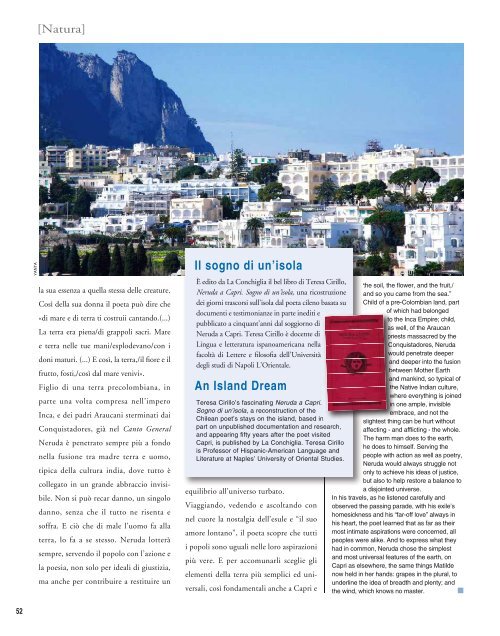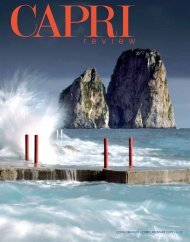COPIA OMAGGIO ⢠COMPLIMENTARY COPY EDIZIONI PRC
COPIA OMAGGIO ⢠COMPLIMENTARY COPY EDIZIONI PRC
COPIA OMAGGIO ⢠COMPLIMENTARY COPY EDIZIONI PRC
You also want an ePaper? Increase the reach of your titles
YUMPU automatically turns print PDFs into web optimized ePapers that Google loves.
[Natura]<br />
YANTA<br />
la sua essenza a quella stessa delle creature.<br />
Così della sua donna il poeta può dire che<br />
«di mare e di terra ti costruii cantando.(...)<br />
La terra era piena/di grappoli sacri. Mare<br />
e terra nelle tue mani/esplodevano/con i<br />
doni maturi. (...) E così, la terra,/il fiore e il<br />
frutto, fosti,/così dal mare venivi».<br />
Figlio di una terra precolombiana, in<br />
parte una volta compresa nell’impero<br />
Inca, e dei padri Araucani sterminati dai<br />
Conquistadores, già nel Canto General<br />
Neruda è penetrato sempre più a fondo<br />
nella fusione tra madre terra e uomo,<br />
tipica della cultura india, dove tutto è<br />
collegato in un grande abbraccio invisibile.<br />
Non si può recar danno, un singolo<br />
danno, senza che il tutto ne risenta e<br />
soffra. E ciò che di male l’uomo fa alla<br />
terra, lo fa a se stesso. Neruda lotterà<br />
sempre, servendo il popolo con l’azione e<br />
la poesia, non solo per ideali di giustizia,<br />
ma anche per contribuire a restituire un<br />
Il sogno di un’isola<br />
È edito da La Conchiglia il bel libro di Teresa Cirillo,<br />
Neruda a Capri. Sogno di un’isola, una ricostruzione<br />
dei giorni trascorsi sull’isola dal poeta cileno basata su<br />
documenti e testimonianze in parte inediti e<br />
pubblicato a cinquant’anni dal soggiorno di<br />
Neruda a Capri. Teresa Cirillo è docente di<br />
Lingua e letteratura ispanoamericana nella<br />
facoltà di Lettere e filosofia dell’Università<br />
degli studi di Napoli L’Orientale.<br />
An Island Dream<br />
Teresa Cirillo’s fascinating Neruda a Capri.<br />
Sogno di un’isola, a reconstruction of the<br />
Chilean poet’s stays on the island, based in<br />
part on unpublished documentation and research,<br />
and appearing fifty years after the poet visited<br />
Capri, is published by La Conchiglia. Teresa Cirillo<br />
is Professor of Hispanic-American Language and<br />
Literature at Naples’ University of Oriental Studies.<br />
equilibrio all’universo turbato.<br />
Viaggiando, vedendo e ascoltando con<br />
nel cuore la nostalgia dell’esule e “il suo<br />
amore lontano”, il poeta scopre che tutti<br />
i popoli sono uguali nelle loro aspirazioni<br />
più vere. E per accomunarli sceglie gli<br />
elementi della terra più semplici ed universali,<br />
così fondamentali anche a Capri e<br />
the soil, the flower, and the fruit,/<br />
and so you came from the sea.”<br />
Child of a pre-Colombian land, part<br />
of which had belonged<br />
to the Inca Empire; child,<br />
as well, of the Araucan<br />
priests massacred by the<br />
Conquistadores, Neruda<br />
would penetrate deeper<br />
and deeper into the fusion<br />
between Mother Earth<br />
and mankind, so typical of<br />
the Native Indian culture,<br />
where everything is joined<br />
in one ample, invisible<br />
embrace, and not the<br />
slightest thing can be hurt without<br />
affecting - and afflicting - the whole.<br />
The harm man does to the earth,<br />
he does to himself. Serving the<br />
people with action as well as poetry,<br />
Neruda would always struggle not<br />
only to achieve his ideas of justice,<br />
but also to help restore a balance to<br />
a disjointed universe.<br />
In his travels, as he listened carefully and<br />
observed the passing parade, with his exile’s<br />
homesickness and his “far-off love” always in<br />
his heart, the poet learned that as far as their<br />
most intimate aspirations were concerned, all<br />
peoples were alike. And to express what they<br />
had in common, Neruda chose the simplest<br />
and most universal features of the earth, on<br />
Capri as elsewhere, the same things Matilde<br />
now held in her hands: grapes in the plural, to<br />
underline the idea of breadth and plenty; and<br />
the wind, which knows no master.<br />
<br />
52



